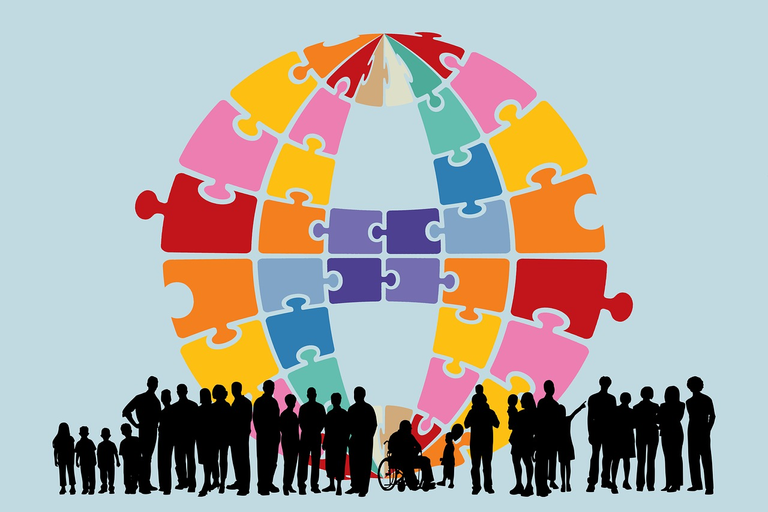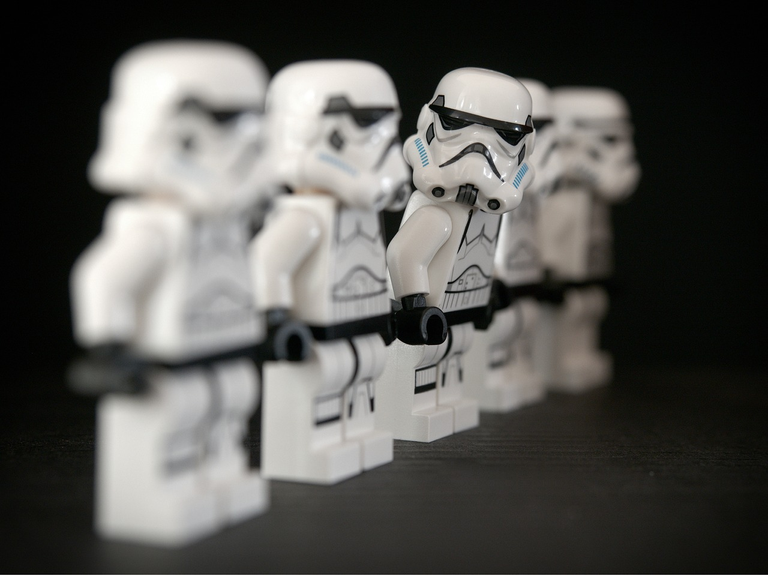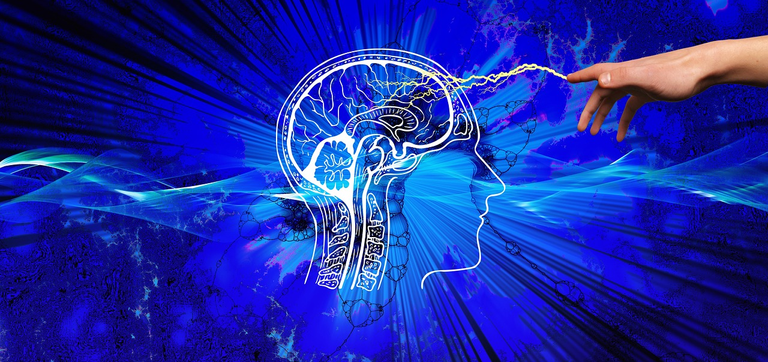Creciste con un nombre y un apellido que no elegiste. De hecho, tampoco escogiste a tus padres.
Creciste creyendo que tenías que ir a la escuela, al instituto, luego a la universidad, obtener un título y encontrar un trabajo en una buena empresa y trabajar unos 25 años hasta la jubilación.
También creciste pensando que tenías que pasar tu vejez sin hacer nada, cuidando de tus nietos, cosiendo o leyendo los periódicos en una mecedora tomando café.
 Parecemos un rompecabezas perfecto, donde todo encaja, nada difiere
Parecemos un rompecabezas perfecto, donde todo encaja, nada difiere
La cuestión de los nietos es obvia, porque también te enseñaron que tenías que casarte, y si era por la iglesia, mejor. Luego tenías que tener hijos ( a mayor cantidad mayor bendición) y dedicarles tu vida. El matrimonio según enseñan, es para toda la vida, para vivir felices para siempre. Algunos incluso te llaman pecador por divorciarte y acabar con una relación en la que hay de todo, menos felicidad y vida.
Hablando de pecados, también te han enseñado que existe un ser supremo llamado Dios, que creó el mundo y lo controla todo, al que debes respeto, amor y obediencia ciega y absoluta. Que es amor y siempre cuida de ti, pero que además de ser amor, también es un fuego devorador y castiga la desobediencia a sus mandamientos con el sufrimiento o la muerte eterna (por supuesto, el tipo de castigo dependerá de la religión o tipo de cristianismo que profeses).
En cuanto a la muerte, has crecido, por supuesto, huyendo de ella, rechazándola con cada fibra de tu ser. Te han dicho que la muerte es lo peor que le puede pasar a un ser humano, y por eso la temes y no quieres morir. Quieres prolongar tu existencia todo lo posible.
 ¿Por qué tememos romper la fila? ¿Preguntar qué pasa más allá de las normas y reglas?
¿Por qué tememos romper la fila? ¿Preguntar qué pasa más allá de las normas y reglas?
Son tantas cosas que hoy creemos, que hoy asumimos como ciertas e inamovibles. Son tantos conceptos tan arraigados en nuestra mente, nuestra alma y corazón. Muchos no los cuestionamos, no nos atrevemos. ¡Y es que ni siquiera se nos ocurre! Son tan propios, tan cotidianos, han estado tan presentes desde que tenemos uso de razón que nos acostumbramos, son nuestros y de nadie más ¿o de muchos más?
Sí, justamente por eso último es que muchas de nuestras creencias son tan fuertes: muchos las creen y entre todos nos las reforzamos, nos las recordamos y confirmamos. Por eso cuando alguien se atreve a preguntarse ¿POR QUÉ? ¿CÓMO? ¿PARA QUÉ? ¿DE DÓNDE? la mayoría se escandaliza, se sorprende y no entiende cómo pudo tener las agallas de razonar, de dudar y de cuestionar.
Pero esa es la tarea diaria de cada ser humano, al menos así lo veo yo. Ese debe ser uno de nuestros objetivos: analizar, reflexionar, cuestionar, pensar, meditar sobre lo que creemos. Está en nosotros saber por qué creemos lo que creemos, en saber la raíz de nuestra forma de ver la vida. No quedarnos con las dudas, con esas incomodidades existenciales, no ahogar esa inconformidad espiritual, emocional e intelectual.
 Conectemos con nuestra mente, con nuestro interior, con nuestro intelecto
Conectemos con nuestra mente, con nuestro interior, con nuestro intelecto
Una vez lo hice, me arriesgué a contradecir mis creencias, cuestionar mi fe y de ser toda la vida creyente en el dios del cristianismo, hoy me considero agnóstico. Pero nos solo se trata de religión. En mi caso siempre estoy cuestionando hasta mi manera de caminar y en el próximo post haré una segunda parte respondiendo (a modo personal) los planteamientos iniciales de esta publicación.
Mientras, sería pertinente tu opinión al respecto, sería demás de interesante saber qué opinas sobre estos cuestionamientos al sistema.

You grew up with a first and last name that you didn't choose. In fact, you didn't choose your parents either.
You grew up believing that you had to go to school, college, then college, get a degree and find a job at a good company and work for about 25 years until retirement.
You also grew up thinking that you had to spend your old age doing nothing, taking care of your grandchildren, sewing, or reading the newspapers in a rocking chair drinking coffee.
The issue of grandchildren is obvious, because they also taught you that you had to get married, and if it was in the church, the better. Then you had to have children (the greater the number, the greater the blessing) and dedicate your life to them. Marriage, as they teach, is for life, to live happily ever after. Some even call you a sinner for divorcing and ending a relationship in which there is everything but happiness and life.
Speaking of sins, you have also been taught that there is a supreme being called God, who created the world and controls everything, to whom you owe respect, love and blind and absolute obedience. That it is love and always takes care of you, but that in addition to being love, it is also a devouring fire and punishes disobedience to its commandments with suffering or eternal death (of course, the type of punishment will depend on the religion or type of Christianity you profess).
As for death, you have grown up, of course, running from it, rejecting it with every fiber of your being. You have been told that death is the worst thing that can happen to a human being, and that is why you fear it and do not want to die. You want to prolong your existence as long as possible.
There are so many things that we believe today, that today we assume as true and immovable. There are so many concepts so deeply rooted in our mind, our soul and heart. Many of us do not question them, we do not dare. And it doesn't even occur to us! They are so our own, so everyday, they have been so present since we can remember that we get used to them, they are ours and no one else's, or many more?
Yes, that is precisely why many of our beliefs are so strong: many believe them and we all reinforce them, remind each other and confirm them. That's why when someone dares to ask **WHY? AS? SO THAT? FROM WHERE? ** The majority is shocked, surprised and does not understand how he could have the guts to reason, to doubt and to question.
But that is the daily task of every human being, at least that's how I see it. That should be one of our objectives: analyze, reflect, question, think, meditate on what we believe. It is up to us to know why we believe what we believe, to know the root of our way of seeing life. Not to be left with doubts, with those existential discomforts, not to drown that spiritual, emotional and intellectual disagreement.
Once I did it, I took the risk of contradicting my beliefs, questioning my faith, and having been a lifelong believer in the god of Christianity, today I consider myself an agnostic. But it's not just about religion. In my case I am always questioning even my way of walking and in the next post I will do a second part responding (in a personal way) to the initial approaches of this publication.
Más sobre mí
 🔥
🔥  🔥
🔥 
 🗣️
🗣️  🖋️
🖋️  🖱️
🖱️ 


